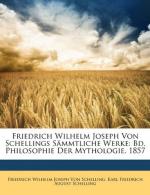|
This section contains 866 words (approx. 3 pages at 300 words per page) |

|
SCHELLING, FRIEDRICH (1775–1854), German philosopher. Born at Leonberg in Württemberg, Friedrich Wilhelm Joseph Schelling received his early education at the preparatory seminary at Bebenhausen, where his father, a Lutheran minister, was professor of Old Testament studies. From an early age, Schelling was exposed both to Lutheranism and to the Swabian mystical pietism of Bengel and Oetinger. Precociously entering the University of Tübingen at fifteen, he enthusiastically espoused (with his comrades G. W. F. Hegel and Friedrich Hölderlin) the ideas of the French Revolution and the philosophy of Kant. At the time of his first professorship in 1798, at Jena, Schelling had met J. G. Fichte, had published in significant journals, and had offered a synthesis of the new philosophy and the new natural sciences.
Schelling's philosophical career unfolded in four major periods: Fichtean transcendentalism (to 1796); systems synthesizing the history of consciousness and nature (to 1806); explorations...
|
This section contains 866 words (approx. 3 pages at 300 words per page) |

|


